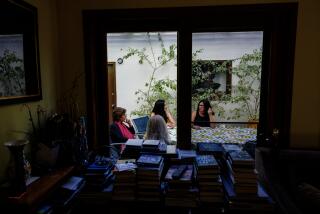Maple Center, Founded to Help Teens, Carves a Broader Base : Mental health: After 20 years on the job, the agency assists everyone from latchkey children to senior citizens.
- Share via
BEVERLY HILLS — The Maple Center got its name in part because people were worried about the stigma of running a teen drug rehabilitation center in Beverly Hills. Officials hoped to avoid controversy by giving it a nondescript name that gives no information other than its location.
Apparently it worked. This year, the Maple Center celebrates its 20th anniversary with a gala birthday ball on Oct. 27 honoring former First Lady Rosalynn Carter for her years of service to the mental health field. The center now has an $857,000 annual budget, offices on Wilshire Boulevard and an ambitious mission that goes far beyond its humble beginnings.
The Maple Center was founded in 1972 by a group of community leaders who wanted to combat the teen-age drug problem in Beverly Hills, said Dr. Stan Katz, the center’s clinical director. The idea was to provide a place where teen-agers could go for counseling for drug, alcohol and personal problems.
But almost from the start, the nonprofit center has served as a mental health center for the entire community, Katz said. The Maple Center offers nearly 20 programs, including tutoring for elementary school children and training for senior citizens to become peer counselors for other seniors who may be feeling isolated and alone.
“We really are a community health center,” Katz said.
The common thread running through all of the center’s programs is a commitment to offering low-cost counseling to people who live or work in the city. The programs are woven into the fabric of the community, said executive director Jack Armstrong, with ties to the city, the schools and the community.
City police call on counselors from the center to go out with them on difficult calls involving suicide attempts and accident or crime victims. The center has trained 15 peer counselors at the Fire Department to help firefighters deal with the stress of their jobs and taught the library staff how to deal with “nasty and obnoxious patrons,” Katz said.
Last year, the center set up a “phone friend” service for latchkey children that operates between the hours that school lets out and parents get home to help children with non-emergency needs. The service, called the warm line, is staffed mainly by volunteer senior citizens.
The center has always been heavily involved with the city’s four elementary and one high school, Katz said, with Beverly Hills Unified School District paying the Maple Center $27,500 toward counseling services it provides in the schools. But there is also a lot of volunteer work provided at no cost to the schools.
After-school tutoring for struggling elementary school students has been a component almost from the center’s beginning. In the first few weeks of school, teachers identify children who need special one-to-one attention, said Adrienne Weise, the program’s coordinator. By mid-October, 50 volunteer tutors will be paired with 50 elementary students, meeting at Beverly Vista or Horace Mann elementary schools once a week from October through May.
Students are referred if they are having trouble with fractions or retaining what they are reading, but the underlying cause of their problems could be anything from difficulties at home to feeling lost in a large classroom to just being disorganized, she said.
“Lots of kids are just disorganized. Nobody has taught them how to study,” said Weise, who is also a substitute teacher. Tutors try to help the children learn to organize.
The volunteer tutors come from diverse backgrounds and include lawyers, doctors, retired teachers and an advertising executive, she said. What they share is a love for kids and a desire to help them.
“There’s a lot of nurturing and very direct attention,” Weise said.
The center also operates a 24-hour crisis hot line and provides therapy to individuals, couples and families on a sliding scale with fees that range from nothing to $75 per session.
It surprises people, but “we serve a low-income clientele,” Armstrong said. The average income for clients is less than $20,000 per year.
That really “blows away the stereotypes people have about Beverly Hills” being a city only for the affluent, he said.
Clients include single mothers who struggle to live in Beverly Hills because of the quality of the schools and police protection, and senior citizens who may have nice homes but live on a fixed income, Katz said.
The center provides counseling for nearly 400 people per week and there’s a waiting list, Katz said. The center employs a staff of 12 psychologists, social workers and counselors and about 70 interns working toward various state licensing requirements.
Money to pay for Maple Center programs comes from a variety of sources, Armstrong said. Its budget includes $100,000 from the city, the money from the school district, fees from clients, government grants, corporate and individual contributions, and the annual dinner dance, which brings in as much as $250,000, he said. Last year, the center also had a telethon that brought in $35,000, he said.
Armstrong acknowledged that “having to raise a budget year after year, especially in an economy like this, is really difficult.”
Now that the Maple Center is well-established in the community, the center’s goals are to establish an endowment to fund its programs, and to eventually purchase its own building, he said.
More to Read
Sign up for Essential California
The most important California stories and recommendations in your inbox every morning.
You may occasionally receive promotional content from the Los Angeles Times.













